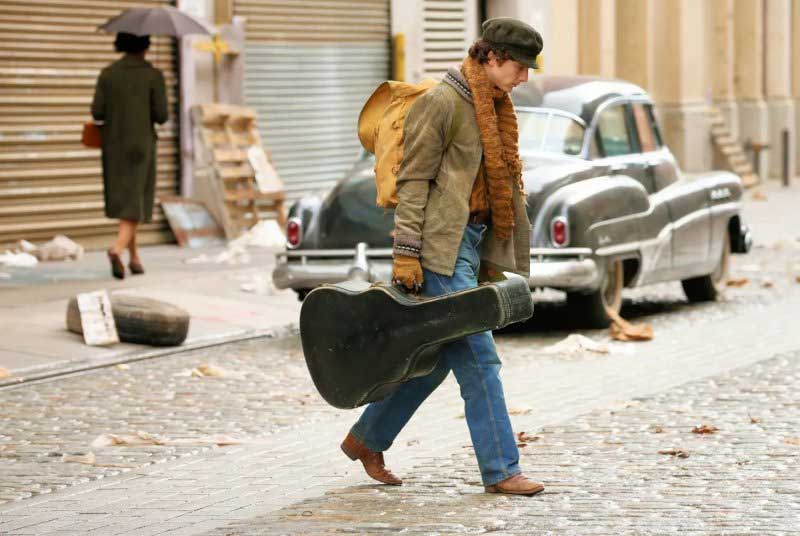
There’s no doubt that Timothée Chalamet does a sterling job of inhabiting that shape-shifter Bob Dylan in A Complete Unknown. The songs are tackled well, Dylan’s speaking voice is not too nasal or parodic, the slightly stooped stance at the microphone convinces, the grubby, scuffling early Bob on the streets of Greenwich Village is vivid and persuasive……..there’s so much that’s been done so well in this film, which tackles Dylan’s early career from 1961 to turning electric at the Newport Folk Festival of 1965. Just don’t leave the cinema thinking it’s entirely truthful or the full story.
The episodes of Dylan’s early trajectory it takes seriously still remind you of the astonishing velocity of his fame in those five years. Early scenes are pretty faithful on his meeting with Woody Guthrie, then dying of Huntingdon’s disease in hospital in New Jersey; his friendship with Pete Seeger is touching, as Bob sofa-surfs at his house; Seeger’s hounding by the Unamerican Activities Committee for being a red – all this is taken pretty straightforwardly from biographical details. Early on, Dylan’s willingness to enjoy rock’n’roll and unwillingness to be labelled a folk singer tees up the final confrontational scenes in Newport in 1965.
It’s less convincing on some of the other early figures as Dylan begins to make his mark and move out of the Greenwich Village coffee houses. Sylvie, the Suze Rotolo figure, seems bloodless and the real Rotolo’s liberal, bohemian charisma – see the cover of The Freewheelin’ Bob Dylan for photographic proof of this – seems absent from Eliie Fanning’s characterisation. You just don’t believe he would have fallen for this blonde waif. Joan Baez, fleshed out by Monica Barbaro, fares better, but their final arguments over duetting onstage during Dylan’s April- May 1965 English tour become just a few snarky moments onstage at Newport. This feels like an unusual directorial decision, given that their fractious relationship is at the centre of many key scenes in Dont Look Back, D A Pennebaker’s classic documentary of the tour.
In fact, there are quite a few important moments missing from the narrative arc of A Complete Unknown. The effect The Byrds’ electric version of ‘Mr Tambourine Man’ had on Dylan is one of them, as is the restlessness exhibited by Dylan during the 1965 English acoustic tour. Pennebaker’s film shows Dylan gazing at electric guitars in music shops and befriending Alan Price of The Animals, whose version of ‘House of the Rising Sun’ was yet another flashing electric signpost. Dylan’s love of English bands becomes just one mumbled line defending The Kinks in the film, yet he had already arranged a studio session with John Mayall’s Bluesbreakers whilst in Britain, and met Lennon and McCartney. All of this is nowhere to be seen. Instead, the songs pour out of young Bobby, ultimately leading to ‘Highway 61 Revisited’ and ‘Like a Rolling Stone’.
The studio sessions for ‘Like a Rolling Stone’ are faithfully, evocatively recreated, and the hostility Dylan faced performing with the Butterfield Blues Band at the Newport Festival in 1965 makes for a pretty thrilling climax to the story. Soldiering on in front of a largely hostile audience, booing and throwing cups, we root for Dylan, an exposed, surprisingly frail figure in front of all the waves of rejection. It didn’t stop there, however: on the 1966 tour with The Band, he again faced such hostility every night over his electric sets and then, in Manchester, came the famous ‘Judas’ catcall, provoking him further. This is such a pivotal moment in Dylan’s career that you wonder what on earth persuaded the film-makers to transplant the incident wholesale into the Newport ‘65 scene, a year earlier. Were they hoping fervent Dylan followers wouldn’t object?
As stated earlier, there’s much to enjoy here. Chalamet’s portrayal of the ‘Highway 61’ shades-wearing Dylan is pitch-perfect and his unreliability over women is also believable. The pressures of fame begin to engulf Dylan later in the film, and yet he’s still able to tool around on his motor-bike up to Newport. The insurmountable problem, however, is if you stood any of this film up against the 1966 footage of the frazzled, defiant Dylan of Pennebaker’s 1966 film Eat the Document, it would pale in comparison. Martin Scorcese used the ‘Judas’ incident from this in his film No Direction Home, and in it Dylan, unabashed, responds to the heckler, then instructs The Band to play louder. They then launch into the most incendiary version of ‘Like a Rolling Stone’ you will ever hear. What a pity A Complete Unknown cuts off in 1965, a year before this legendary tour: luckily, The Bootleg Series Vol. 4 preserves for listeners the whole glorious performance. Chalamet can only come very, very close to the blazing artistic defiance Dylan exhibited in such confrontations.
M.C.Caseley / Feb ‘25
.
